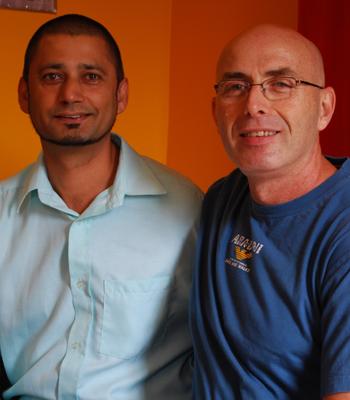A gay Toronto couple was detained for 28 days in Dubai for carrying the prescription arthritis drug Celebrex, which is banned in the United Arab Emirates (UAE).
Rocky Sharma and Stephen Macleod, who have been together for 10 years, were stopped upon arrival in Dubai on Aug 2, where they planned to spend the day before returning to Toronto from a vacation in India.
Macleod had a bottle of the prescription arthritis medication Celebrex in his suitcase. They were told Celebrex is a controlled substance in UAE and, even though they did not present themselves to border officials as a couple, both partners were detained.
“I think they thought we were gay and we would have some party drugs with us,” says Sharma, who is now safely back at home with his partner. “They were definitely targeting people who are young, from the western world and nicely dressed, like they are going to party.”
The UAE has very tough drug laws. Even over-the-counter medications that include traces of codeine are restricted. Possession can result in lengthy jail sentences, heavy fines or the death penalty, according to an advisory issued by the Canadian Department of Foreign Affairs and International Trade (DFAIT).
Calls to DFAIT were not returned before press time.
Sharma says he and Macleod were given limited information about why they were being detained because border officials in the UAE did not speak English.
They were not given an opportunity to contact a lawyer or consular officials but Sharma managed to contact friends at home on his Blackberry, which he had on him at the time of his arrest. Those friends gave him the emergency contact number of the Canadian embassy in Abu Dhabi, which Sharma called before his Blackberry was confiscated. Sharma’s family also contacted DFAIT in Canada but their efforts were stymied by the long weekend.
“When I sent the message, we were thinking we were going back home,” says Sharma. “That’s when I took it out of my bag and sent the SOS message. They were taking us toward the airport, but I’m glad I sent it because they were taking us to the detention centre. We were very lucky about that.”
Sharma and Macleod were forced by their captors to submit urine samples for drug testing. Sharma says they were told they were being held pending the results of the urine tests. They were kept in a filthy prison cell with eight other prisoners for 10 days before they were sent to separate prisons.
“If you get a blanket and a pillow you’re very lucky,” he says. “For the first few days we slept on the floor. The bathroom conditions were just a hole in the ground for 200 people. Food was just rice with some kind of sauce on it three times a day.”
For the next 18 days, Sharma and Macleod could only communicate with each other via the case worker provided by the Canadian consulate.
“That was one of the worst parts, because I had no idea how he was doing, he had no idea how I was doing,” says Sharma. “We were told by the embassy not to even hint that we were a couple, to act like we were only friends, and that’s what we did.”
Homosexuality is punishable by death in UAE.
Even when the couple was formally declared innocent by the Dubai prosecution on Aug 18, they were kept another 11 days while their paperwork was processed.
DFAIT currently advises travellers to the UAE to “exercise high degree of caution” but does not issue an official warning against travel. Anyone carrying personal medication is advised to consult the UAE Ministry of Health Drug Control Department before travelling to confirm that the medication is allowed in the country.
Sharma says he and his partner will never return to the Emirates after their experience.
“We’ll never go back to that country,” he says. “What people need to know is that we were stopped because they thought we were gay guys. They thought we might be carrying party drugs.”


 Why you can trust Xtra
Why you can trust Xtra


